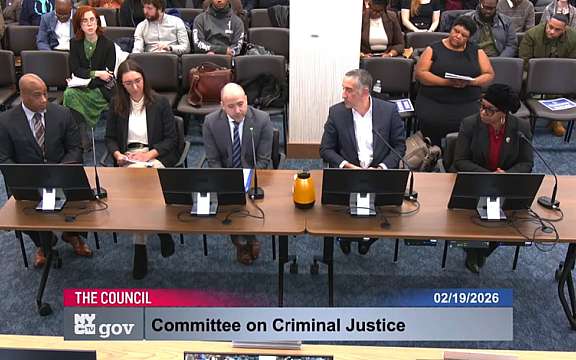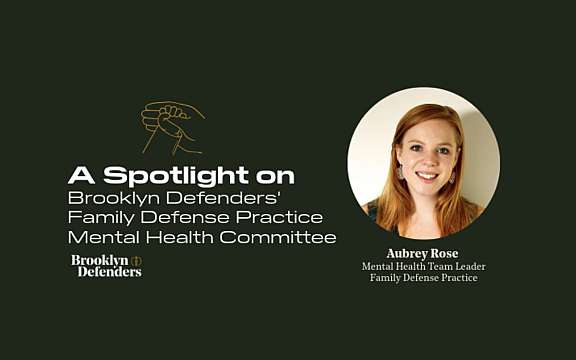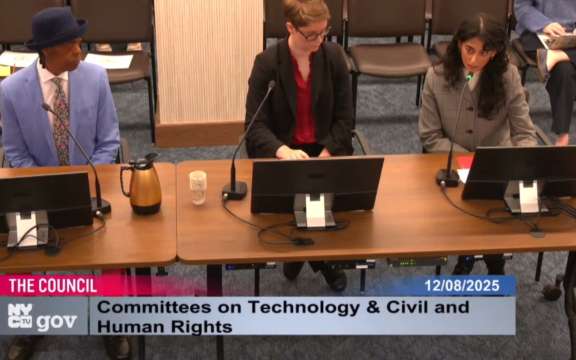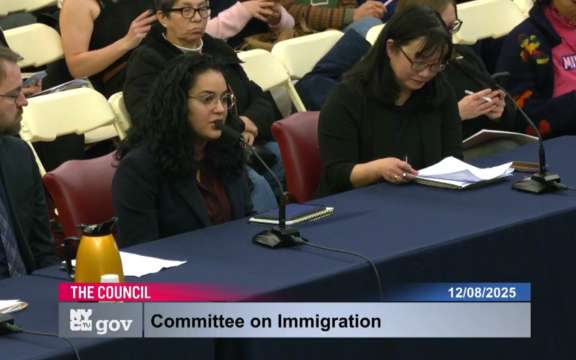BDS Testimony Before The New York City Council Committee on Civil and Human Rights Jointly with the Committee on General Welfare Oversight Hearing on Rental Assistance and Source of Income Discrimination on Housing Instability
TESTIMONY OF:
Alexandra Dougherty
Senior Staff Attorney and Policy Counsel, Civil Justice Practice
BROOKLYN DEFENDER SERVICES
Presented before
The New York City Council Committee on Civil and Human Rights Jointly with the Committee on General Welfare Oversight Hearing on Rental Assistance and Source of Income Discrimination
and
Introduction of Bills Int 0146-2018, Int 2047-2020, T2019-4051
September 15, 2020
Introduction
I. My name is Alexandra Dougherty, and I am a Senior Staff Attorney and Policy Counsel of the Civil Justice Practice at Brooklyn Defender Services (BDS). I want to thank the Committee on Civil and Human Rights and the Committee on General Welfare, and Chairs Mathieu Eugene and Stephen Levin, for inviting us to testify today. I would like to take this opportunity to speak in support of removing barriers to permanent affordable housing for New York City tenants. Brooklyn Defender Services provides multi-disciplinary and client-centered criminal, family, and immigration defense, as well as civil legal services, social work support and advocacy, for nearly 30,000 clients in Brooklyn every year. BDS’ Civil Justice Practice (CJP) aims to reduce the civil collateral consequences for our clients who have had interaction with the criminal, family or immigration legal systems. We also serve our clients with additional civil legal needs; we know that even a minor housing or benefits issue, if unaddressed, can have insurmountable repercussions, especially for our clients who are already dealing with serious problems in other forums.
Proposed Legislation
Given that clients of the Civil Justice Practice are already embroiled in other legal systems, they routinely face multiple barriers to stable and affordable housing. Our clients experience housing instability in a variety of forms: we defend clients from eviction in Housing Court, provide proactive relocation assistance and benefits advocacy, and guide clients through the shelter system. Our affordable housing specialist works with clients who are coming from the shelter system or facing eviction from their current housing to secure stable housing. Through this work we see how our clients are forced to compete over a limited housing pool because of restrictive vouchers. For many of our clients, housing options are even further limited by an old arrest or conviction history. These clients are also ineligible for federally subsidized and public housing—supposedly the housing of last resort.
BDS supports Intro numbers 0146-2018, 2047-2020, and T2019-4051. We applaud the city’s efforts to remove barriers to affordable housing by banning discriminatory background checks and strengthening rental assistance voucher programs. Our colleagues in the Fair Chance for Housing Coalition have made clear how discriminatory background checks perpetuate cycles of homelessness, and we encourage the Council to continue supporting access to stable housing for all New Yorkers.
Int. 0146-2018,Int. 2047-2020, and T2019-4051
Brooklyn Defender Services supports Int 2047-2020, a Fair Chance for Housing law for New York City. An arrest or conviction should not constitute a permanent barrier to stable housing. Yet formerly incarcerated individuals are nearly ten times more likely to experience homelessness than the general public, and in New York City eighty percent of people leaving Rikers directly enter the DHS shelter system. Prohibiting housing discrimination on the basis of an arrest or conviction record is an important step towards guaranteeing equal access to stable housing for all New Yorkers.
Brooklyn Defender Services also supports Int 0146-2018and T2019-4051. Rental assistance vouchers are a vital resource for New Yorkers experiencing homelessness or at risk of eviction, but continued source of income discrimination and the current voucher rent caps strictly limit the pool of housing available to voucher holders. This limited pool of low-rent housing is already the most competitive, with the lowest vacancy rate in the city. By more fully prohibiting source of income discrimination and raising voucher rent limits, today’s bills will enable more homeless New Yorkers to secure stable housing.
The need for these bills is made even greater by the impending eviction crisis brought by the Covid-19 pandemic. Although vacancy rates are increasing and rents are decreasing city-wide, the opposite is true in neighborhoods hardest hit by the pandemic.1These neighborhoods also see the highest rates of eviction filings in the city.2The experiences of our clients over the past six months support that data. Clients who are searching for stable housing—either moving out of the shelter or relocating due to a holdover proceeding—have been universally unsuccessful since March. Most of these clients are voucher-holders, and we have found that the voucher-eligible housing stock has dramatically decreased since March.
One Civil Justice Practice client, Mr. J, has been living in a DHS shelter for over nine months and trying to move into permanent housing with a CityFHEPS voucher. He continued his diligent apartment hunting throughout the pandemic. He was even approved for an apartment in June, but days before his schedule move date he learned, with no explanation, that the apartment was no longer available. Every time he manages to contact a broker with an available FHEPS-eligible apartment he has arbitrarily lost out to one of the dozens of other hopeful voucher holders competing for the same apartment. Mr. J’s experience is exemplative of the way in which our clients are effectively barred from permanent housing.
When housing discrimination, rising rents, and other factors make affordable housing inaccessible, our clients are forced to remain in living situations made unsafe by abusive relationships or building disrepair. One such client, Ms. R, owes a small amount of rental arrears from when she lost employment due to the pandemic. Despite the eviction moratorium still in place, her landlord began threatening to lock her out unless she paid the arrears immediately. Ms. R, who is a Spanish speaker and a noncitizen, was terrified that her landlord would illegally evict her, or worse, physically harm her. We acted quickly to diffuse the situation and assert Ms. R’s rights, but ultimately she wants to move to an apartment where she feels safe from retaliation. Removing barriers to housing is vital for clients like Ms. R.
Recommendations
BDS enthusiastically supports the council’s commitment to removing barriers to housing for justice-involved New Yorkers. With that commitment in mind, we urge the council to consider public housing residents and applicants. While the passage of Int 2047-2020 will provide much needed support for justice-involved New Yorkers hoping to gain access to private housing, the bill does not apply to state or federally funded housing including NYCHA, which officially houses 400,000tenants, and unofficially is home to up to one million New Yorkers.
While NYCHA tenancy requirements are governed by federal law, NYCHA’s own regulations go significantly further than legally required in barring potential tenants with conviction records and in evicting current tenants who have any contact with the criminal justice system. At BDS, we represent clients every year who are denied by NYCHA after years on the waiting list or face eviction from their longtime NYCHA homes because of an old conviction or an arrest, even one that does not result in a criminal conviction. Amidst Brooklyn’s affordable housing crisis and rampant gentrification, these clients have nowhere else to go.
We ask the council to consider Int 2047-2020 as a necessary starting point in our goal to ensure truly equal access to stable housing. Going forward, it is vital that we work towards returning public housing to its intended purpose of providing safe stable housing for the most vulnerable New Yorkers.
Conclusion
BDS supports today’s bills and the city’s ongoing efforts to remove barriers to stable housing for all New Yorkers. With our partners in the Fair Chance for Housing coalition, we will continue to fight to remove remaining barriers facing justice-involved New Yorkers. Thank you for considering my comments. If you have any questions, please feel free to reach out to me at 718-254-0700 ext. 141 or adougherty@bds.org.



